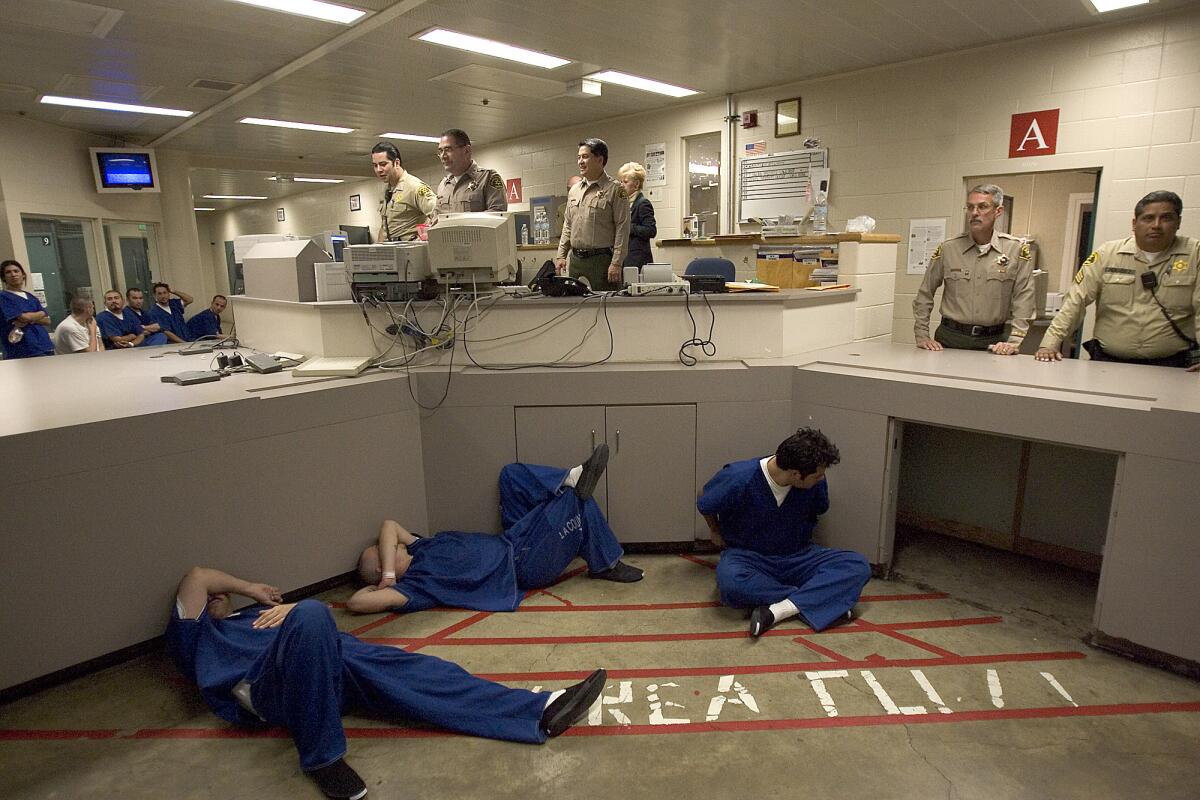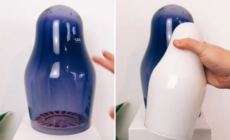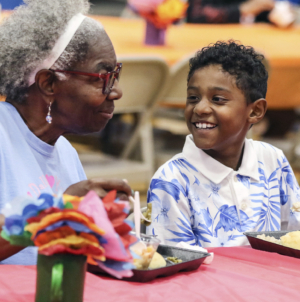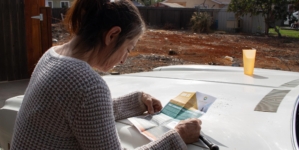-
The search for Hannah Kobayashi finally ends after a month of tragedy and uncertainty - 17 mins ago
-
Diddy Accused of Rape, Assault in Lawsuits Filed by Three Men, reports - 36 mins ago
-
How Covid Can Change Your Gut - 37 mins ago
-
Column: Is it time for California’s Latino Legislative Caucus to let in Republicans? - 58 mins ago
-
Why Blocking The Onion From Buying Infowars Was ‘Right Decision’—Attorney - about 1 hour ago
-
European Central Bank Cuts Interest Rates as the Economy Weakens - about 1 hour ago
-
Two arrested in ‘pig butchering’ that cost San José man $170,000 - 2 hours ago
-
Churches Will No Longer Provide Sanctuary for Migrants Under Trump - 2 hours ago
-
How America Turned Allies into Enemies in Afghanistan - 2 hours ago
-
What sleeping in prison is like: Moldy beds, bright lights, 24/7 noise - 2 hours ago
What sleeping in prison is like: Moldy beds, bright lights, 24/7 noise
Steven Backstrom was struggling to stay awake during his shift in the prison shoe factory. The machines could be dangerous if you weren’t paying attention, and he’d slept about 3½ hours.
Activity at the Clements Unit, a state prison in Amarillo, Texas, was always churning. Night after night, doors slammed and people yelled. Sometimes, staff delivered medications at 2 a.m. Many nights officers forced him to come to the front of his cell for a security check. The sleepless nights made him feel like a scum had settled over his brain.
But he didn’t have the choice to skip work. The job didn’t pay, and if he didn’t show up, he could be punished.
That morning, he pushed the wrong button on a machine, and the equipment, meant to mold the shape of the shoe, clamped down on Backstrom’s right hand. The pain was excruciating. When he lifted his hand, his fingers were so badly mangled, he thought it looked like they were wobbling in the air. Backstrom later described the injuries in a handwritten grievance he sent to prison officials in 2011: stitches and metal pins in his pinky and ring finger.
Backstrom sued the prison system over the accident the following year, blaming the injury on sleep deprivation, but a federal judge dismissed the suit. More than a decade later, Backstrom still cannot close his hand. He still can’t get a decent night’s sleep because relentless interruptions and noise remain a part of the nightly routine at the Clements Unit where he remains incarcerated.
The Marshall Project and Los Angeles Times have identified more than 30 lawsuits regarding sleep deprivation behind bars over the last three decades — including one that ended in a settlement requiring changes at a San Francisco jail three years ago. More than two dozen interviews with incarcerated people, guards and oversight officials from Georgia to Texas to California show that extreme lack of sleep continues to be a problem in prisons and jails.
Sleep may seem like a trivial issue, one of comfort. But lack of sleep can cause serious mental and physical ailments and even lead to early death. U.S. and international courts have recognized sleep deprivation as cruel and unusual punishment.
Poor sleep can also cause broader institutional problems; a community where no one is adequately rested may be more likely to have conflicts and fights. Sharon Dolovich, a professor at the UCLA School of Law, has been researching sleep deprivation in prisons and jails for a forthcoming academic paper and said she was surprised at the paucity of studies on the topic, considering that it affects almost every aspect of the corrections system, from security to mental and physical health.
“It is a deep and pervasive and serious problem,” Dolovich said. “And the attention that is being paid to it … across the board is so minuscule compared to the scale of the problem.”
The reasons people can’t sleep behind bars can vary widely. Sometimes, the prisons are too cold in the winter or too hot in the summer. Sometimes, the lights never go off, or there aren’t any mattresses, or the facilities are just too loud.
In Los Angeles, jail officials have a long history of failing to provide the men and women in their care with bedding, sheets or a place to sleep. In the 1970s, after several people incarcerated in the downtown jails filed a class-action lawsuit over poor conditions there, a federal judge ordered the Los Angeles County Sheriff’s Department to provide better sleeping conditions. But the department failed to consistently do so, and more than three decades later another judge found officials guilty of “deliberate indifference” for failing to provide bunks.
“Quite simply, that a custom of leaving inmates nowhere to sleep but the floor constitutes cruel and unusual punishment is nothing short of self-evident,” U.S. District Judge Dean D. Pregerson wrote in 2007.
Before Pregerson issued his ruling, one man testified that he’d been forced to sleep under another man’s bunk in a five-person cell, where he’d eventually developed a staph infection from the mold and mildew.
“Prisons may not deprive those in their care of a basic place to sleep — a bed,” Pregerson said. “For, like wearing clothing, sleeping in a bed identifies our common humanity.”
This year, when oversight inspectors with the county’s Sybil Brand Commission visited Men’s Central Jail, they noticed some of the mattresses were moldy. After they visited the Twin Towers Correctional Facility across the street, they laid out their concerns in a lengthy report.
“Most people in the areas we visited do not have sheets or pillows,” they wrote. “A couple of people reported they were cold because they did not have enough blankets to cover themselves.”
A few months later, commissioners returned to Men’s Central Jail and noted that many of the mattresses “were ripped or had chunks of the mattress missing,” and the men incarcerated there couldn’t formally complain because there were no grievance forms or pencils to fill them out.

Detainees sleep on the floor while waiting to be processed at Men’s Central Jail in downtown L.A.
(Brian van der Brug / Los Angeles Times)
In an emailed statement this month, the Sheriff’s Department said it gives out mattresses that are “clean and intact” but that they are sometimes “intentionally damaged” by people using them.
The department also said that “a lot” of reforms have taken place since 2007 and that the jails “have not had floor sleepers due to a lack of housing in many years.” In response to a follow-up question, the department said that now, when people are forced to sleep on the floor, it is due to processing delays and not overcrowding.
However, an October oversight report contradicted that point, noting that people held at the county’s largest jail still report they are sometimes forced to sleep on floors due to lack of space.
In some jails and prisons, guards check on each prisoner once — or several times — per hour, clanging cellblock doors and shining lights in everyone’s faces to make sure they haven’t escaped and are still alive. A man in prison in Georgia, who asked to remain anonymous for fear of retaliation, said his unit has “huge lights” and frequent middle-of-the-night emergency counts at 3 a.m. or 4 a.m. “I wear earplugs and skip breakfast,” he said.
But in many facilities, it’s not just the doors and the lights. In 2013, Michael Garrett sued Texas prisons, alleging that meal, work, headcount and medication times started so early in the morning it was impossible to get more than 2½ hours of uninterrupted sleep. The state nearly succeeded in fending off the case; but this year, the 5th U.S. Circuit Court of Appeals sided with Garrett, saying his suit should move ahead. The case is pending.
This year, Steven Baughman, who is incarcerated in a different Texas prison, told The Times and the Marshall Project that he usually gets up just after 2 a.m. to make it to the medical wing for his 3 a.m. insulin shot. Then he goes to the chow hall for breakfast and goes about his day, which he said doesn’t end until the last count at around 11 p.m.
An employee at another unit described a similar schedule there. The employee asked to remain anonymous because they were not authorized to speak on the record and feared retaliation. They provided records this year showing that the unit’s last standing count takes place just before midnight, and the prisoners working first shift start their day at 2 a.m. Breakfast is served two hours later.
The Texas Department of Criminal Justice refused to release daily schedules for other units in response to a records request, but officials said they adjusted schedules statewide in 2022 to cut the number of daily prisoner counts from eight to six.
“This reduction increased operational efficiencies, improved staffing challenges and allowed inmates more uninterrupted time,” prison spokeswoman Amanda Hernandez wrote in an email, adding that the prison system also now uses night lights instead of overhead lighting for middle-of-the-night counts.
According to the National Institutes of Health, sleep deprivation is linked to a myriad of problems, including heart disease, diabetes and stroke, as well as mental health issues, such as depression and suicide. And there are unique risks in a carceral setting. According to filings in one lawsuit, people awaiting trial in two different San Francisco County jails were so cognitively impaired from sleep deprivation that they were unable to adequately participate in their defense at court.
Maureen Hanlon, a civil rights attorney with ArchCity Defenders, saw something similar with clients jailed in the St. Louis area. “It shows up in how they’re able to cooperate, how they’re able to understand, how they’re able to rationally think through things,” Hanlon said. She believes sleep deprivation is a hidden contributing factor to people taking bad plea deals.
John Thompson was incarcerated for more than 37 years at prisons in Pennsylvania. He spent some of that time in solitary confinement, where he said the lights were on around the clock. He tried stretching out his socks and wrapping them over his eyes to block out the light, but it wasn’t enough.
“It feels like your body can never rest. Like it’s always daytime. So when you try to go to sleep, sleep don’t come,” he said.
Thompson remembers watching one of the men in a cell next to him deteriorate after experiencing intense sleep deprivation. When he first arrived he seemed fine, Thompson said. But after weeks of complaining he couldn’t sleep under the bright lights, the man began describing voices no one else could hear. He grew combative, flooding his cell with water and screaming through the night, which in turn made it difficult for others to sleep.
Thompson was released from prison in 2017 and now works at the Abolitionist Law Center, which files lawsuits over poor conditions behind bars. One of those suits — filed this year — complains of continuing issues with sleep deprivation due to the constant illumination in solitary confinement cells in Pennsylvania prisons. Pennsylvania officials declined to comment, citing the ongoing litigation.
Because there are many problems that lead to sleep deprivation, fixing it requires many solutions. Prison officials can provide cleaner and better quality bedding and make sure facilities are not too cold or hot. They can dim lights in the evening and adjust schedules and protocols so people aren’t awakened throughout the night for meals, medicine or security checks. They can release people at low risk of re-offending so facilities are less crowded, which could allow beds to be farther apart in dorms and decrease noise.
Around-the-clock checks and 24/7 lighting are ostensibly security measures, but Dolovich is skeptical that such measures actually help prevent suicides or escapes. The time between checks, she reasons, is more than sufficient to attempt suicide, and nighttime escapes from locked facilities are extremely unlikely. The problems created by sleep deprivation can hinder the very things officials say they want. Suicide is correlated with lack of sleep. Dolovich says prison officials are trying to prevent people from being able to kill themselves while not considering the factors that might contribute to why they are suicidal, such as sleeplessness.
“Decisions that are made about how the facilities are going to be run reflect an inability to recognize the humanity of the people inside,” she said.
She makes a similar argument about security: Sleep-deprived people are more likely to get in fights, so security measures that make sleep worse can backfire.
A man who was recently incarcerated at Florence State Prison Complex in Arizona said he has observed how poor sleep can lead to violence. He is not named out of concern for his safety.
“It’s like a bubble: Everything builds up and builds up and builds up. And then if you have enough of those individuals in the same environment, it’s eventually gonna pop,” he said.
This article was published in partnership with the Marshall Project, a nonprofit news organization covering the U.S. criminal justice system. Sign up for their newsletters, and follow them on Instagram, TikTok, Reddit and Facebook.
Source link















